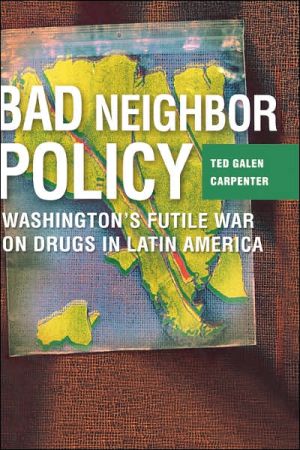Bad Neighbor Policy
The domestic phase of Washington's war on drugs has received considerable criticism over the years from a variety of individuals. Until recently, however, most critics have not stressed the damage that the international phase of the drug war has done to our Latin American neighbors. That lack of attention has begun to change and Ted Carpenter chronicles our disenchantment with the hemispheric drug war. Some prominent Latin American political leaders have finally dared to criticize Washington...
Search in google:
In this scathing attack on the United States' "War on Drugs" in Latin America, Carpenter (Vice President for Defense and Foreign Policy Studies, Cato Institute) pronounces the policy to have given rise to a rising tide of corruption and violence and a growing hostility among Latin Americans towards their own governments and the United States. He describes the roots of the policy in the Nixon years, examines its expansion and militarization under the George H. W. Bush and Bill Clinton, and looks at the possibilities for spreading violence in Colombia and Mexico because of the policy. He also devotes one chapter to discussion of the domestic consequences of the Drug War, urging the abandonment of prohibitionist strategies throughout the Americas. Annotation ©2003 Book News, Inc., Portland, OR Publishers Weekly Far from a sloganeering metaphor, the war on drugs is an all-too-bloody reality, argues this meticulous and impassioned indictment of U.S. drug policy. While it has eroded civil liberties at home, the author argues, the war on drugs has been a catastrophe for Latin American countries. Their governments have been pressured by the U.S. into adopting a heavy-handed and unpopular program of drug prohibition; peasants have had their crops poisoned by drug eradication programs; dozens of planes have been shot down at the behest of U.S. surveillance teams; and brutal DEA-organized drug sweeps have inspired large protests. Meanwhile, he says, the proceeds from the illicit drug trade flow into the hands of criminal syndicates and guerilla insurgents, fueling the civil war in Colombia and a plague of corruption and gang violence throughout Latin America. Meanwhile, despite all the attempts at suppression, the worldwide market for drugs has exploded and drug prices are as low as ever. Carpenter, a vice president at the libertarian Cato Institute and author of The Captive Press, argues that the failure of the war on drugs is the predictable consequence of defying the law of supply and demand. Given the strong market for drugs, attempts at prohibition result in high prices and irresistible profits for farmers and smugglers willing to risk criminal sanctions. The only solution, he contends, is full legalization of marijuana, cocaine and heroin. It s a provocative thesis, but Carpenter s thorough research, sober argumentation and clear writing strengthen this challenge to what he sees as the reigning prohibitionist orthodoxy. (Feb.) Copyright 2003 Reed Business Information.
AcknowledgmentsIntroduction : Thirty Years of Failure1Ch. 1Forging the Bad Neighbor Policy: The Drug War from Nixon to Reagan11Ch. 2Escalating and Militarizing the Drug War: The Bush and Clinton Years33Ch. 3Plan Colombia: A Dangerous New Phase in the Drug War59Ch. 4A Mix of Flawed StrategiesCh. 5Washington's "Ugly American" Tactics123Ch. 6Reaping the Whirlwind: Consequences to Latin American Societies153Ch. 7Mexico: The Next Colombia?169Ch. 8Polluting the Republic: The Drug War at Home195Ch. 9A Blueprint for Peace: Ending the War on Drugs223Notes235Index267
\ From the Publisher"...war on drugs is an all-too-bloody reality, argues this meticulous and impassioned indictment of U.S. drug policy."—Publishers Weekly Annex (February 3, 2003)\ "A refreshingly candid, controversial, and hard-hitting assessment of Washington's increasingly expensive...utterly futile campaign against illegal drugs."—Kenneth Maxwell, Foreign Affairs\ "Mr. Carpenter asks Washington to stop its demeaning and costly 'spectacle of alternately bribing and threatening its neighbors....'"—William H. Peterson, Washington Times\ \ \ \ \ \ Publishers WeeklyFar from a sloganeering metaphor, the war on drugs is an all-too-bloody reality, argues this meticulous and impassioned indictment of U.S. drug policy. While it has eroded civil liberties at home, the author argues, the war on drugs has been a catastrophe for Latin American countries. Their governments have been pressured by the U.S. into adopting a heavy-handed and unpopular program of drug prohibition; peasants have had their crops poisoned by drug eradication programs; dozens of planes have been shot down at the behest of U.S. surveillance teams; and brutal DEA-organized drug sweeps have inspired large protests. Meanwhile, he says, the proceeds from the illicit drug trade flow into the hands of criminal syndicates and guerilla insurgents, fueling the civil war in Colombia and a plague of corruption and gang violence throughout Latin America. Meanwhile, despite all the attempts at suppression, the worldwide market for drugs has exploded and drug prices are as low as ever. Carpenter, a vice president at the libertarian Cato Institute and author of The Captive Press, argues that the failure of the war on drugs is the predictable consequence of defying the law of supply and demand. Given the strong market for drugs, attempts at prohibition result in high prices and irresistible profits for farmers and smugglers willing to risk criminal sanctions. The only solution, he contends, is full legalization of marijuana, cocaine and heroin. It s a provocative thesis, but Carpenter s thorough research, sober argumentation and clear writing strengthen this challenge to what he sees as the reigning prohibitionist orthodoxy. (Feb.) Copyright 2003 Reed Business Information.\ \ \ Foreign AffairsA refreshingly candid, controversial, and hard-hitting assessment of Washington's increasingly expensive, internationalized, and, according to Carpenter, utterly futile campaign against illegal drugs. This "war" was first proclaimed three decades ago by President Richard Nixon. Yet more illegal drugs now flow into the United States than did during the mid-1980s, and consumer demand has created an international industry in which the average drug-trafficking organization can afford to lose 90 percent of its product and still remain profitable. Meanwhile, Washington's abrasive tactics and focus on "supply side" interdiction have increasingly led Latin American governments to wage vigorous wars against their own citizens. In the United States, the tactics promoted by drug-war zealots and some local law enforcement agencies pose a serious threat to civil liberties. Carpenter vigorously argues for a radical change in policy: "The only realistic way out of this morass is to adopt a regime of drug legalization" and the termination of what he sees as counterproductive "prohibitionist" strategies. Will any politicians take up his challenge? Unlikely. Is a sober debate needed on the 30-year failure of U.S. drug policies? Without question.\ \








